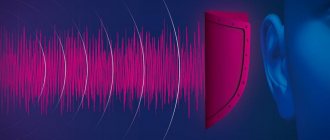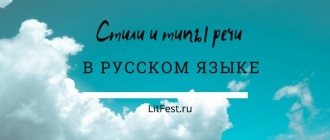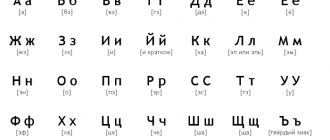When checking written work in the Russian language, the teacher not only corrects errors, but also indicates their type in the margins. It is the nature of the errors that these strange dashes, checkmarks and other squiggles indicate. Such a system allows the teacher to easily determine what grade to give to the student, and the teacher himself to understand why his grade was lowered and what rules need to be worked on. Today we will talk about what mistakes there are in the Russian language. I will classify them with examples in a convenient tabular form and help you decipher the mysterious signs that literature teachers leave in the margins of notebooks with written work on the Russian language.
Types of errors in Russian
| Symbol | Error type | Explanation | Examples |
| I | Orthographic | Errors in the spelling of words (in roots, prefixes, endings), including in the placement of hyphens, in continuous and separate spelling. | Somehow (correct: somehow), exams (correct: exams), in a fur coat (correct: in a fur coat), ran away (correct: ran away). |
| V | Punctuation | Errors in the placement of punctuation marks (incorrect choice of punctuation mark, its absence in the right place or its presence where it is not needed). | The boy crouched under the branches of a tree and ran home - where his father, who had arrived from a business trip, was waiting for him. (The boy, bending down, crawled under the branches of the tree and ran home, where his father, who had arrived from a business trip, was waiting for him.) |
| G | Grammar | Errors in the formation of words and their forms, as well as in their choice (incorrect agreement in numbers, cases). | The most beautiful (the most beautiful or the most beautiful), the richer (richer), in accordance with the decree (according to the decree), payment for travel (payment for travel or fare). |
| R | Speech | Errors in the use of vocabulary (including paronyms, homonyms, synonyms), including tautology. | Diploma of the competition (diploma of the competition), price list (price list or prices). |
| WITH | Stylistic | Use of vocabulary that has an inappropriate stylistic coloring (usually colloquial, slang). Can be considered a type of speech error. | And then the main character of the story went crazy (that’s right: he made a mistake). This episode is cool (interesting, memorable). |
| Z | Violation of paragraph division of text | The text is incorrectly divided into micro-topics or paragraphs are not highlighted at all. | |
| F | Actual | The content of the text is distorted (when writing an exposition or essay) | Dubrovsky met Masha when he was robbing Troekurov (as it actually happened, I told you earlier). |
| L | Logical | Errors in the logical construction of the text (usually they are associated with a violation of the cause-and-effect relationship). This also includes syntactic errors that lead to a distortion of the meaning or its double interpretation. | Dubrovsky was a noble robber, so he decided not to rob Troekurov. (Dubrovsky was a noble robber, so he, having fallen in love with Masha Troekurova, decided not to rob her father.) There are many works about love in Russian literature. (There are many works about love in Russian literature.) |
Schoolchildren and their parents rarely have doubts about what kind of punctuation or spelling error was made in written work on the Russian language. Everything can be seen from the teacher’s corrections. But if speech, grammatical, logical and factual errors are detected in the work, questions arise.
The Federal Institute of Pedagogical Measurements (FIPI) has developed recommendations for language teachers checking students' test papers on the classification of errors that occur in these papers. You can download a classifier table with examples from the link.
Below you will find a brief description of typical errors, compiled on the basis of the “Methodological materials for chairmen and members of subject commissions of the constituent entities of the Russian Federation on checking the completion of tasks with a detailed answer of the Unified State Examination papers” and “Methodological recommendations for preparing for the final essay”. The last document concerns creative work (essays, presentations) that students complete in the winter for admission to the Unified State Exam.
Violation of the rules of semantic agreement of words
Semantic coordination is the mutual adaptation of words according to the principle of their real meanings. For example, the following expressions are considered incorrect:
- “Colorless black trees sway in the wind” - trees cannot be “colorless” and “black.”
- “The horses slowly rushed at full speed” is a speech error, since “slowly” (meaning slowly), and “at full speed” (galloped with all their might).
This also includes pleonasms and tautologies.
- Pleonasm is inappropriate verbosity, excessive use of words: “overall dimensions”, “first premiere”, “price list”, “young youth”.
- Tautology - phrases with a common root: “an incident happened”, “to capture impressions”, “oil”.
Types of grammatical errors
| Error number | Nature of grammatical error | Examples of grammatical errors |
| 1 | Incorrect word formation | Kowtow, mock |
| 2 | Incorrect noun form formation | I like many cakes. |
| 3 | Incorrect form of adjective | More beautiful |
| 4 | Incorrect formation of numeral form | He went shopping with only five hundred rubles. |
| 5 | Incorrect formation of pronoun form | Their talents |
| 6 | Incorrect formation of the verb form (including participles, gerunds) | They want to flow down |
| 7 | Incorrect negotiation | A group of people involved in the robbery have been identified. |
| 8 | Mismanagement | Grandma can make the cake more delicious. |
| 9 | Disruption of communication between the main members of the sentence | Most stood their ground. |
| 10 | Incorrect way of expressing a predicate | The young man was handsome and slender. |
| 11 | Incorrect construction of sentences with homogeneous members | Anti-anxiety and good mood remedy |
| 12 | Incorrect construction of sentences with participles | Thinking about good things, the anxiety still did not go away. |
| 13 | Incorrect construction of sentences with participial phrases | The sky was strewn with shining stars overhead. |
| 14 | Incorrect construction of a complex sentence | The film made me think about the meaning of life, which I watched yesterday. |
| 15 | Mixing indirect and direct speech | The critic noted that I don’t see anything new in this picture. |
| 16 | Incorrect sentence division | After the lights went out. Nothing bad happened. |
| 17 | Mixing types of tense forms of verbs | The nightingale will fall silent for a moment, and then sing again (or sing again). |
| 18 | Skipping a word | It is impossible to simplify the process (of what?). |
| 19 | Incorrect use of particles | It would be nice if we heard this work not recorded. |
There are several classifications of grammatical errors, which is why their numbers may vary.
Writing rules
People make grammatical and speech errors not only in the process of live communication. Many people make mistakes during correspondence, drawing up reports, and writing texts. These include spelling errors. A person allows them because he does not know how to hyphenate, write or abbreviate words. They forget to put two “nn” instead of one, they write “a” instead of “o”, they neglect soft signs at the endings of verbs with “sh”. Errors can be minor (for example, a person missed a letter by missing a key), but there are also outright absurdities. There was even a case when a schoolboy made four mistakes in the word “hedgehog”, writing “yosh”. However, this is a child who is just learning, and when adults, accomplished individuals make absurd mistakes, it is at least strange. Therefore, you need to watch your speech so that, as they say, you don’t get into trouble.
Types of speech errors
| No. | The nature of the speech error | Examples of speech errors |
| 1 | Using a word with a meaning that is not proper to it | Thanks to the fire, the family was left homeless. |
| 2 | Inability to distinguish shades of meaning that prefixes and suffixes add to a word | She looked effective in this dress. After the explanation, the girl’s attitude towards her fan did not change. |
| 3 | Incorrect use of synonymous words | In the final chapter, the author reveals his attitude to the problem. |
| 4 | Unjustified use of stylistically colored vocabulary (jargon, clericalism, etc.) | The hero spoke on the merits of the matter during a meeting with his beloved in the gazebo. |
| 5 | Unjustified use of emotionally charged words and phraseological units. | Gogol knew how to make people laugh. |
| 6 | Unjustified use of colloquial expressions | The hero squandered his entire fortune. |
| 7 | Errors in lexical compatibility | The work has the following artistic means. |
| 8 | Speech insufficiency (missing a word), speech redundancy (extra words) | Attract readers to the problem raised. Very beautiful landscapes. |
| 9 | Tautology (the use of words with the same root in one sentence or neighboring ones) | The story tells about the life of a common man. |
| 10 | Unjustified repetition of a word | I liked the book. The book talks about love. The book is written in living language. |
| 11 | Uniformity of syntactic constructions | When the young man saw the girl, he fell in love with her at first sight. When the hero met the bear, he was not afraid. |
| 12 | Poor use of pronouns | This novel was written by Pushkin. It is recognized as a masterpiece of Russian literature. |
Speech errors (unlike grammatical ones) are associated not with the construction of language units, but with their use.
At the level of phrases
When choosing a word, you should take into account not only its meaning in the literary language, but also lexical compatibility. Not all words can be combined. This is determined by their semantics, emotional coloring, stylistic affiliation, grammatical properties, etc. When it is difficult to determine whether certain words can be used together, you should turn to a compatibility dictionary. This will help to avoid errors at the level of phrases, sentences, and also text.
Errors at this level occur when there is a violation of various syntactic connections. For example, agreement: “I want to teach everyone volleyball - this is a good, but at the same time difficult sport” (a good, difficult sport). Controls: “I feel a thirst for glory”, “I am amazed at his strength”, “gain strength”. The connection between the predicate and the subject may be disrupted: “Neither heat nor summer is eternal (the singular form is used instead of the plural form “eternal”). All of these are types of speech errors at the level of phrases.
Types of logical errors
Logical errors are associated with incorrect construction of a monologue statement (essay text, presentation). They can be different, ranging from violation of cause-and-effect relationships to omission of important parts, distraction to other topics.
Here are the most common logical errors:
- the sequence of statements is broken;
- there is no connection between parts of the utterance;
- the already stated judgment is repeated several times;
- a micro-theme includes another micro-theme;
- parts of the statement are disproportionate;
- a necessary part of the statement is missing (logical leap);
- cause-and-effect relationships are broken;
- the logical-compositional structure of the text is disrupted;
- there is a comparison of the incomparable.
You can give examples of logical errors in different parts of the text.
An unsuccessful opening can be characterized by the fact that the first sentence contains a reference to context, which, of course, is absent before the introduction. For example, when the text begins with the words: “In this work...”.
In the main part of the text, disparate concepts may be brought together in one sentence, for example: Prostakova mocked the serfs and was forced to take care of giving her son a decent education.
Logical errors in the central part of a statement also include an incorrect sequence of sentences, when, for example, one thought is expressed, then another, then a return to the first is made.
Violation of cause-and-effect relationships is also observed, most often, in the main part of the text.
Examiners will consider a conclusion duplicated in two sentences to be an unsuccessful ending
Types of factual errors
Factual errors involve misrepresentation of information. Typically, these errors occur when referring to works that the student analyzes in his creative work.
Factual errors include:
- distortion of the content of the work, its fundamentally incorrect interpretation, poorly chosen example;
- paraphrasing a quote, inaccuracy in it, attributing a statement to another author;
- presenting facts that do not correspond to reality (including historical ones);
- distortion of the names and surnames of writers, heroes, titles of literary works.
Factual errors may also consist of obvious exaggeration or understatement of an event or phenomenon referred to by the author of a creative work.
Factual errors are not language errors.
Important Note
As part of the school curriculum, the basic rules of the Russian language are studied, but not all. If an error is made according to a rule that students did not go through, it is corrected, but is not taken into account when evaluating the work. The teacher should do the same with graphic errors (obvious typos, clerical errors). We will talk in more detail a little later about how written works in the Russian language are assessed, for which mistakes the mark is reduced and by how many points, and which mistakes are not taken into account. The purpose of this article was to help you understand what errors there are in the Russian language, what type are those that the teacher discovered in a particular work. I hope I completed the task I set myself.
Share
- 2










